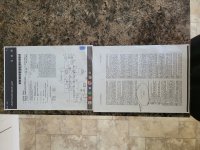Hi Guys & Girls
Without prejudice
Morning, found something interesting the other day, going through some old GPF information I've collected recently.
It concerns a 2022 4.0 Cayman GTS, GPF report, it shows the K241 value Particulate filter, bank 1 diagnostic value of installation check %.
It also uses a K242 value for bank 2.
It recorded values of 46.4 and 48.3 %.
On our cars we have the same K241 values that never have any data recorded they always show 0.00%.
This seemed very strange, so I did a bit more research and found this information below.
ITDV is Installation Test Diagnostis Value
To resolve it:
Run the Installation Test in PIWIS (under “Maintenance/Repairs → Function Group → Installation Test”).
See photo below.
Between 40% to 60% says
Basic adaptations written (VIN), immobiliser sync, etc.
If you look at the higher value 60 to 80 % it covers
Functional checks (sensor calibration, internal tests).
We are well aware that Porsche Dealers are struggling to reset the oil ash values, after all the new parts have been fitted.
They have to carry out regenerations on brand new filters, and carry out extensive road testing, WHY.
They are now saying that an oil ash value of 56% showing on a vehicle thats had a new GPF fitted is ok, according to Porsche Technical.
We all know thats absolutely ridiculous
Could it be that if this ITDV check was not carried out correctly on the PDI on our faulty cars, or there was some possible software issue at the time, could this have caused this premature oil ash warning light to come on.
We have never seen any readings in our K241 values, but how do we know its was ok.
I have researched VW,s process when replacing a GPF filter this is what they do.
:
Yes, you must run an installation test to reset the Engine Control Unit (ECU) after replacing a GPF (Gasoline Particulate Filter) or DPF (Diesel Particulate Filter) on a VW. This is necessary to clear the old filter's data, reset the ash ‣ounter, and calibrate the differential pressure sensor, ensuring the new filter can operate correctly. Without this procedure, the new filter can quickly become blocked, and vou may encounter performance issues or warning lights.
Well if its good for VW, it should be the same for use.
We will be now looking at this PWIS function to see if it does exist, and try and get more information about its function.
Dave
Without prejudice
Morning, found something interesting the other day, going through some old GPF information I've collected recently.
It concerns a 2022 4.0 Cayman GTS, GPF report, it shows the K241 value Particulate filter, bank 1 diagnostic value of installation check %.
It also uses a K242 value for bank 2.
It recorded values of 46.4 and 48.3 %.
On our cars we have the same K241 values that never have any data recorded they always show 0.00%.
This seemed very strange, so I did a bit more research and found this information below.
ITDV is Installation Test Diagnostis Value
- The ECU has not yet been properly initialized or coded.
- A required basic setting or adaptation was skipped.
- The ECU was cloned or fitted without proper installation using the official PIWIS tool.
To resolve it:
Run the Installation Test in PIWIS (under “Maintenance/Repairs → Function Group → Installation Test”).
- Complete all adaptations, coding, and calibrations.
- Verify the ITDV status changes to “OK” or the expected success value.
See photo below.
Between 40% to 60% says
Basic adaptations written (VIN), immobiliser sync, etc.
If you look at the higher value 60 to 80 % it covers
Functional checks (sensor calibration, internal tests).
We are well aware that Porsche Dealers are struggling to reset the oil ash values, after all the new parts have been fitted.
They have to carry out regenerations on brand new filters, and carry out extensive road testing, WHY.
They are now saying that an oil ash value of 56% showing on a vehicle thats had a new GPF fitted is ok, according to Porsche Technical.
We all know thats absolutely ridiculous
Could it be that if this ITDV check was not carried out correctly on the PDI on our faulty cars, or there was some possible software issue at the time, could this have caused this premature oil ash warning light to come on.
We have never seen any readings in our K241 values, but how do we know its was ok.
I have researched VW,s process when replacing a GPF filter this is what they do.
:
Yes, you must run an installation test to reset the Engine Control Unit (ECU) after replacing a GPF (Gasoline Particulate Filter) or DPF (Diesel Particulate Filter) on a VW. This is necessary to clear the old filter's data, reset the ash ‣ounter, and calibrate the differential pressure sensor, ensuring the new filter can operate correctly. Without this procedure, the new filter can quickly become blocked, and vou may encounter performance issues or warning lights.
Well if its good for VW, it should be the same for use.
We will be now looking at this PWIS function to see if it does exist, and try and get more information about its function.
Dave












